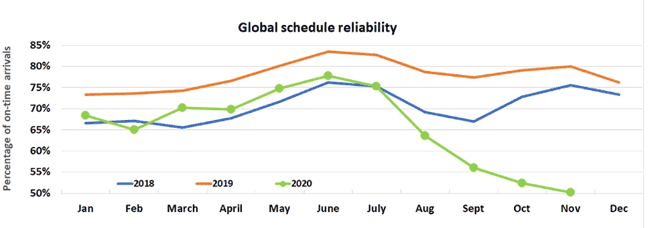Ocean container shipping ports and terminals across the globe are battling chronic congestion amount a surge in global trade, with delays and much uncertainty about when containers will be off loaded due to bottlenecks at the arriving port or a preceding stop.
Supply Chain Digest Says... |
 |
|
Those last minute port changes can also be costly to the carriers, so the schedule extensions can improve their bottom lines as well as providing customers more reliability. |
|
 |
|
What do you say? |
|
| Click here to send us your comments |
|
| |
|
| Click here to see reader feedback |
|
|
|
Some carriers have a new solution – extend the previously published schedule by a number of days, slowing the promised arrival of goods but perhaps hitting those dates a lot more consistently.
For example, German container carrier Hapag-Lloyd announced it was adding seven days to the westbound schedule of an Asia to South America east coast vessel schedule for at least 13 weeks.
The company's announcement noted that this "schedule sliding" was needed due to the significant congestion from "challenging operational conditions in Asia."
Other carriers are said to be considering similar moves.
In an email to customers. Hapag-Lloyd noted additional schedule time would enable it "to cope with the delays, minimizing port cancellations and disruptions, hence providing you a more reliable service".
The web site theloadstar.com reported this week that the carrier's CEO Rolf Habben Jansen had in fact referenced the "slidings" strategy during a webinar presentation last week, in which he said "Looking at congestion we see at US ports and other places we will still see delays in the first quarter, and we will not see a lot of blankings, but we will see slidings, because when a ship has to wait six days at one port, and at another port it has to wait four days, you are 10 days behind schedule, which in reality means that you also lose a week, even if you sail back at top speed."
He added that "So I think that we will see slidings and I think that we will also see all the capacity that is available deployed."
(See More Below
|
CATEGORY SPONSOR: SOFTEON |
|
|
|
|
|
When the carriers fall behind schedule they often skip some port calls in an effort to catch up, causing turmoil for shippers and importers that have their stops voided and their containers dropped off at some other port.
Those last minute port changes can also be costly to the carriers, so the schedule extensions can improve their bottom lines as well as providing customers more reliability.
"Now that it looks like the demand spike will continue until at least the Chinese New Year – and our visibility suggests maybe as far out as Easter," one anonymous carrier executive told theloadstar.com, adding "I think we will have to look more closely at what we can do to improve reliability and add more certainty to the network."
Container schedule reliability fell to just 50.1% in November, according to the analysts at Sea- Intelligence, based on data from 34 trade lanes. That is the lowest score since Sea-Intelligence began tracking the measure in 2011, and compares to a level of 80% in November 2019.

Source: Sea-Intelligence
But the recent fall has a lot more to do with the port congestion than it does operational issues with the carriers themselves.
What are your thoughts schedule extensions by container carriers? Let us know your thoughts at the Feedback section below
Your Comments/Feedback
|

